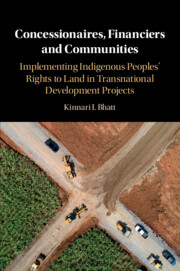 Concessionaires, Financiers and Communities
Concessionaires, Financiers and Communities Published online by Cambridge University Press: 02 March 2020
This chapter provides some economic, social, legal and technical context to development projects and their interfaces with indigenous peoples’ rights to land and the focus of this book. Situating development projects within historical precedents from colonial times, it identifies some important new features of the modern development project landscape. These include the increasing proximity of international economic arrangements and transnational financial transactions such as project finance and its underlying documentary network with issues of indigenous land connection, survival and precarity. Against this background, the book’s objective is to consider how, under the conditions of a development project and its contractual framework and safeguarding policy architecture, private entities and judicial and non-judicial mechanisms frame, conflict with and informally delegate out the recognition and implementation of rights to land for indigenous people. In responding to this objective, I lay out the core themes that repeat throughout: fragmentation, invisibility, power(lessness), priority, delegation, (un)predictability and the integration of public and private remedies.
To save this book to your Kindle, first ensure no-reply@cambridge.org is added to your Approved Personal Document E-mail List under your Personal Document Settings on the Manage Your Content and Devices page of your Amazon account. Then enter the ‘name’ part of your Kindle email address below. Find out more about saving to your Kindle.
Note you can select to save to either the @free.kindle.com or @kindle.com variations. ‘@free.kindle.com’ emails are free but can only be saved to your device when it is connected to wi-fi. ‘@kindle.com’ emails can be delivered even when you are not connected to wi-fi, but note that service fees apply.
Find out more about the Kindle Personal Document Service.
To save content items to your account, please confirm that you agree to abide by our usage policies. If this is the first time you use this feature, you will be asked to authorise Cambridge Core to connect with your account. Find out more about saving content to Dropbox.
To save content items to your account, please confirm that you agree to abide by our usage policies. If this is the first time you use this feature, you will be asked to authorise Cambridge Core to connect with your account. Find out more about saving content to Google Drive.